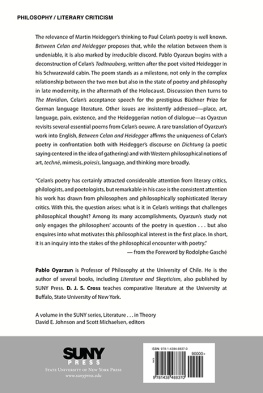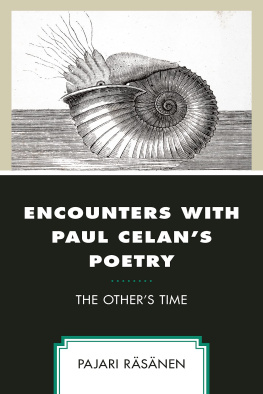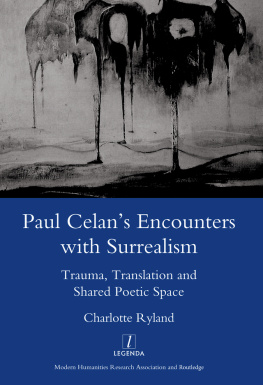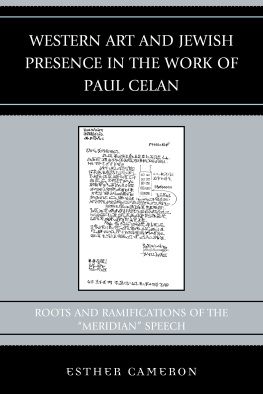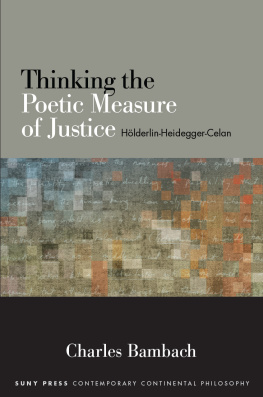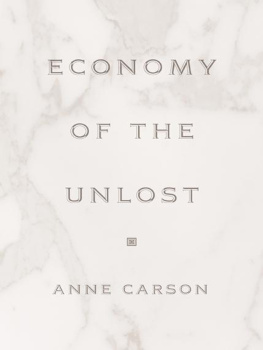Paul Celan - Paul Celan: Selections
Here you can read online Paul Celan - Paul Celan: Selections full text of the book (entire story) in english for free. Download pdf and epub, get meaning, cover and reviews about this ebook. publisher: University of California Press, genre: Detective and thriller. Description of the work, (preface) as well as reviews are available. Best literature library LitArk.com created for fans of good reading and offers a wide selection of genres:
Romance novel
Science fiction
Adventure
Detective
Science
History
Home and family
Prose
Art
Politics
Computer
Non-fiction
Religion
Business
Children
Humor
Choose a favorite category and find really read worthwhile books. Enjoy immersion in the world of imagination, feel the emotions of the characters or learn something new for yourself, make an fascinating discovery.

- Book:Paul Celan: Selections
- Author:
- Publisher:University of California Press
- Genre:
- Rating:3 / 5
- Favourites:Add to favourites
- Your mark:
- 60
- 1
- 2
- 3
- 4
- 5
Paul Celan: Selections: summary, description and annotation
We offer to read an annotation, description, summary or preface (depends on what the author of the book "Paul Celan: Selections" wrote himself). If you haven't found the necessary information about the book — write in the comments, we will try to find it.
Paul Celan: Selections — read online for free the complete book (whole text) full work
Below is the text of the book, divided by pages. System saving the place of the last page read, allows you to conveniently read the book "Paul Celan: Selections" online for free, without having to search again every time where you left off. Put a bookmark, and you can go to the page where you finished reading at any time.
Font size:
Interval:
Bookmark:



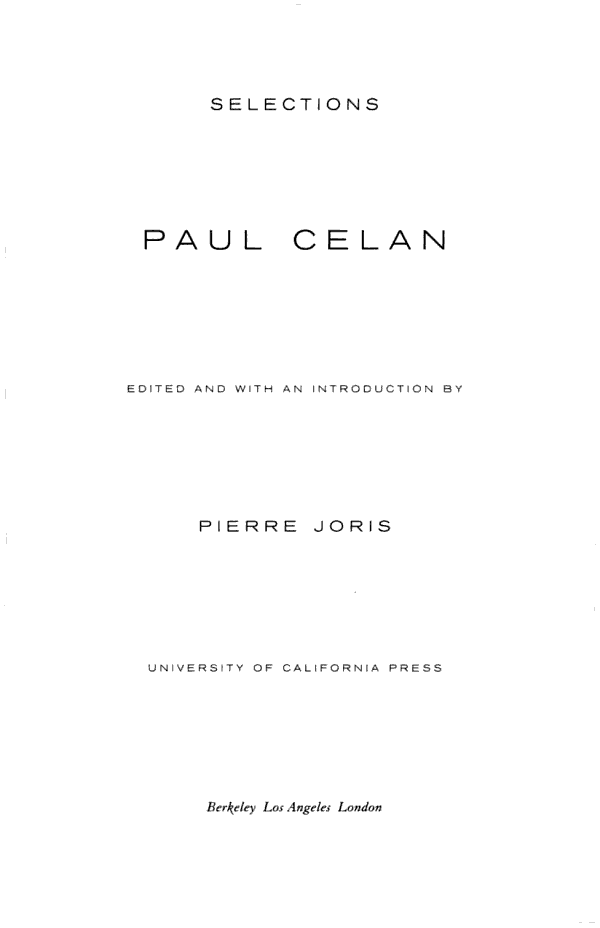
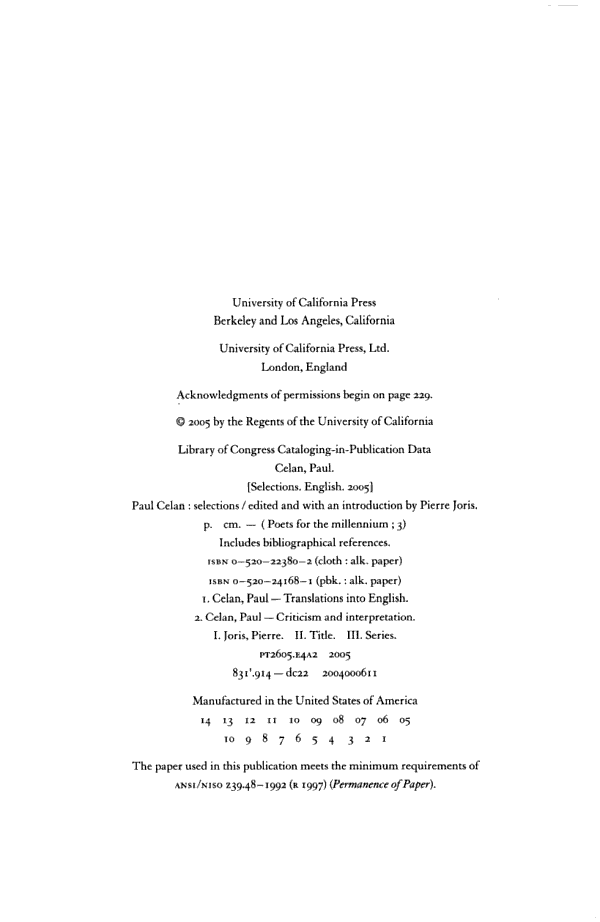
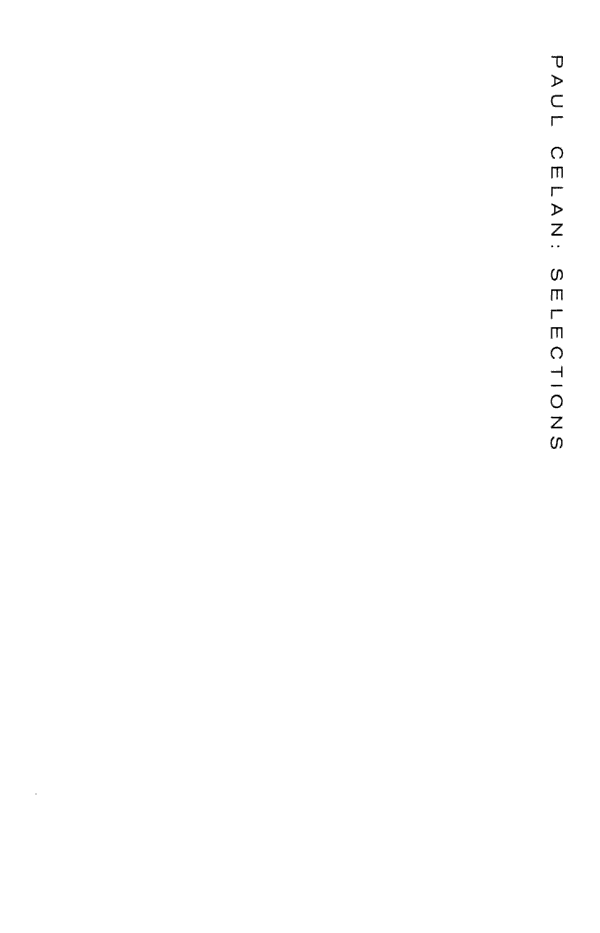
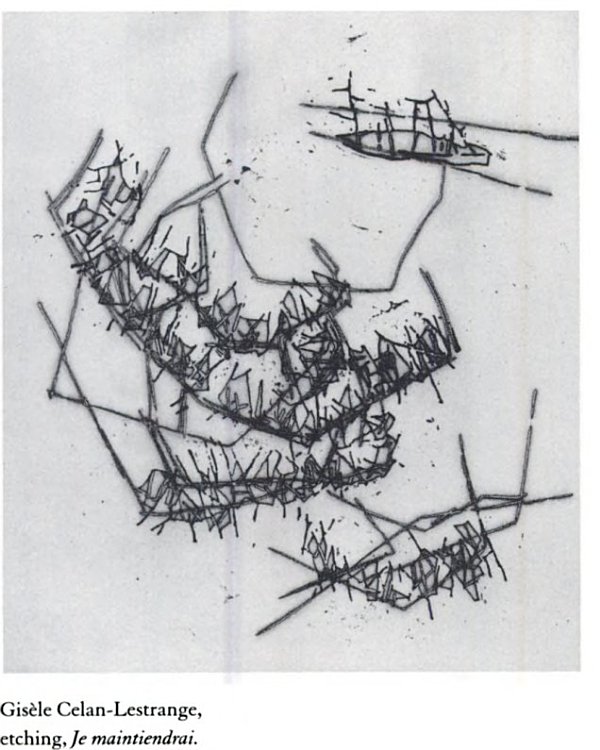
Introduction "Polysemy without mask"
Thirty-four years after his death, Paul Celan's status as the greatest German-language poet of the second half of the twentieth century seems assured. His oeuvre roughly 900 pages of poetry distributed over eleven volumes, 250 pages of prose, more than 1,000 pages of published correspondence, and nearly 700 pages of poetry translated from eight languages has by now received massive critical attention, amounting to an astounding six thousand-plus entries, including reviews, essays, memoirs, and books in a dozen or more languages. And yet the work continues to be to a great extent terra incognita, a vast territory with uncertain, shifting borders, a map on which the unexplored sections by far outweigh the few areas that have been sketched in, reconnoitered.
Even of those textual areas crisscrossed repeatedly by various explorers, we have widely differing and often contradictory reports: it seems that every time a commentator ventures into an already mapped area, he or she returns with a new map charting different coordinates or a different topography for the same place. A Kafkaesque landscape and trek: the terrain the reader is confronted with appears simultaneously stony and amoebic, composed of multilayered strata continuously shifting in shape and consistency. It is so dense and multiple, in fact, that the various critical tunnels drilled into its layers never seem to cross or link up, constituting at best that is, when the critic-explorer at least manages to get back home from the uncharted territories a self-referential or self-interfering network of reticulated interconnections, often more relevant to the explorer's preoccupations than to the land under hand. It is an inexpugnable fortress, an unconquerable landscape, a "hyper-uranian" cosmos.
Why do such geostrategic, quasi-military images and metaphors so readily come to mind when one gropes toward a comprehension and description of Celan and his oeuvre? No doubt the poems themselves, their vocabulary, their syntactical gnarledness, their textual strategies, tactical evasiveness, and philological ruses, propose and even demand such a reading. But the life itself seems to fit such a description: mapped out spatially, it describes an encirclement of Germany, originating in Czernowitz and moving through Bucharest and Vienna to Paris, from where Celan undertakes a number of quick, short raids across the borders into that country. Two of the people he considered his real friends and associates were in fact strategically situated on "meridians" he himself could not inhabit and which helped him to encircle Germany: Osip Mandelstam (the "brother," on whom more later) in Russia and Nelly Sachs (the "sister" poet) in Sweden. I use the military metaphor advisedly, for there seems to me to run through Celan's life if not a desire for assault on Germany and revenge for the death of his parents (or rather of his mother) then at least a constant, unrelenting feeling of being under attack and needing to counter this attack.
The Celanian dynamic is, however, not simple-minded or onedirectional: it involves a complex double movement to use the terms of Empedocles ofphilotes (love) for his mother's tongue) and neikps (strife) against her murderers who are the originators and carriers of that same tongue. He is caught in this love/strife dynamic, the common baseline or ground of which (as Grund, ground, but also and si multaneously asAbgrund, abyss) is the German language, irrevocably binding together both the murdered and the murderer, a dynamic that structures all of Celan's thinking and writing.
But the critics' problems are specific to their undertaking (i.e., their need to prove that the methodologies they are invested in are the right ones and will result in the "true" interpretation of the poem) and should not discourage the reader. It is important to state at the outset that if Celan's poems are often difficult (and get more opaque in the late work) they are not incomprehensible. Celan himself, when asked about the difficulties of the poems, insisted that they were in no way hermetic and that all one had to do was to read them again and again. At the same time he claimed a necessary opacity for poetry today, first because the poem is "dunkel" (dark, obscure) because of its thingness, its phenomenality. In a note toward his essay "The Meridian" he writes: "Regarding the darkness of the poem today, imagination and experience, experience and imagination let me think of a darkness of the poem qua poem, of a constitutive, even congenital darkness. In other words: the poem is born dark; the result of a radical individuation, it is born as a piece of language, as far as language manages to be world, is loaded with world."1
And this world-making, this making of a new world through and in poetry, is what I want to insist on, lest the above description of Celan's relation to Germany would tend to elide the desire for "making it new" and limit Celan's work to a revenge play. It is just that for Celan, as survivor, the poetry that will be that has to be written after Auschwitz has to always remain conscious ofeingedenk the horror of the Shoah. If the past is the abyss and simultaneously the ground on which the work rests, the stance it will take is, however, resolutely forward looking and hopeful (except perhaps in some of the bitter late poems written under the psychic pressure of mental illness). It will certainly not deny the possibility of a new world, of a new and more human age. In early 1946 the American poet Charles Olson suggested in his poem "La Preface" that one world age had come to an end, an age, or yuga, that stretched from the prehistoric caves (among the major discoveries in relation to art of the twentieth century) to the concentration camps: "Buchenwald new Altamira cave/With a nail they drew the object of the hunt." By implication, Olson was simultaneously making the claim for a new age, to begin after Buchenwald. "We are born" he writes, "not of the buried but of these unburied dead" an eerie echo of Celan's "Death Fugue" in which the "we" of the survivors "scoop[s] out a grave in the sky where it's roomy to lie." All poetry, after that date, will have to be, at some level, a poetry of witnessing. But it cannot stop there if it wants to be of essential use, as both Olson and Celan insist; it cannot simply bear witness to the past but must at the same time be resolutely turned to the future: it has to be open, it has to be imaginatively engaged in the construction of a new world, it has to look forward, to be visionary. It is that forward looking, that vertical stance that I also hear in Celan's question about bearing witness for the witness. Celan's work is that of both a witness and a visionary.2
I. Paul Celan, Der Meridian, Endfassung, Vorstufen, Materialien, edited by Bernhard Boschenstein and Heino Schmull, Tubingen Ausgabe (Frankfurt am Main: Suhrkamp Verlag, 1999), 84.
Font size:
Interval:
Bookmark:
Similar books «Paul Celan: Selections»
Look at similar books to Paul Celan: Selections. We have selected literature similar in name and meaning in the hope of providing readers with more options to find new, interesting, not yet read works.
Discussion, reviews of the book Paul Celan: Selections and just readers' own opinions. Leave your comments, write what you think about the work, its meaning or the main characters. Specify what exactly you liked and what you didn't like, and why you think so.

